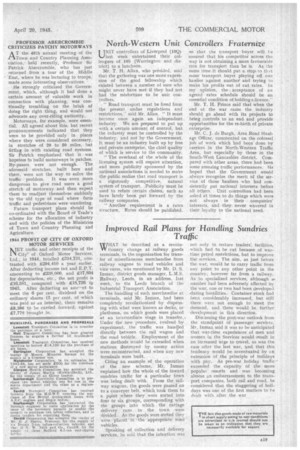Improved Rail Plans for Handling Sundries Traffic
Page 21

If you've noticed an error in this article please click here to report it so we can fix it.
WWHAT he described as a revoluW tionary change at railway goods terminals, in the organization for transfer of miscellaneous merchandise from railway wagons to road vehicles and vice versa, was mentioned by Mr. D. S. Inman, district goods manager, L.M.S. Railway, Leeds, in an address, last week, to the Leeds branch of the Industrial Transport Association.
The handling of such merchandise at terminals, said Mr. Inman, had been completely revolutionized .by dispensing with what were known as decks, or
platforms, on which goods were placed at an in ierinediate Stage in transfer.s. Under the. new procedure-, evolved by experiment, the traffic was handled directly between the rail wagon and the road vehicle. Employment of the new methods would be extended when stations destroyed by enemy action were reconstructed, and when any new terminals were built.
. Citing an example of the operation of the new scheme, Mr. Inman explained ho* the whole of the inward sundries traffic for a particular town was being dealt with. From the railway wagons, the goods were passed on to a. conveyer belt, which took them to a peint where they were sorted into four or six groups, corresponding with the. groups into which . the cartage delivery runs in the town were• divided. As thp goods were sorted they were placed in the appropriate toad vehicles.
Speaking of collection and delivery services, he said that the intention was not only to restore traders', facilities, which had to be cut because of wartime petrol restrictions, but to improve the services. The aim, as just before the war, would be to carry traffic from any point to any other point in the country, however far from a railway. As to specialized services, although anumber had been adversely affected by the war, one or two had been developed -during hostilities:. Container stock had been considerably increased, but still there were not enough to. meet the demand, and there would be. further development in this direction.
Discussing the post-war outlook from the standpoint of passenger services, Mr, Inman said it was to be anticipated that war-time experiencesof men and women in the Services would result in an increased urge to travel, as was the case after the last war, 'and that this tendency would be accentuated by en extension of the principle of holidays with pay. As pre-war holiday traffic-exceeded the capacity of the more popular resorts and was becoming almost an embarrassment to the transport companies, both rail and road, he considered that the staggering of holidays was one of the first matters to he dealt with after the war




















































